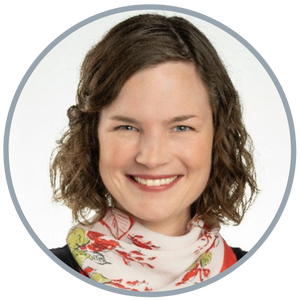
Beyond the Binary: Exploring the State of Transgender and Gender-diverse Nutrition Research (NUTRITION 2024 On Demand Collection)
This course is included in the NUTRITION 2024 On Demand Collection.
The growing transgender and gender-diverse (TGD) community has been historically underrepresented in nutrition science despite growing evidence of nutrition-related disparities (e.g. eating disorders, food insecurity, excess adiposity). Further, there are nutrition implications associated with the trans experiences (e.g. fat redistribution with hormone replacement therapy, use of food and supplements to facilitate gender affirmation). Understanding the behaviors and priorities of the TGD community is paramount to developing inclusive nutrition care practices, interventions, and policies.
Originally presented at NUTRITION 2024, ASN's flagship meeting which was held June 29 to July 2 in Chicago, IL.
Speakers



Avery Anderson, PhD, PMHNP-BC, APRN
Assistant Professor Endowed Early Scholar in Psychiatric Mental Health
University of Colorado College of Nursing
Whitney Linsenmeyer, PhD, RD, LD
Assistant Professor
Saint Louis University
Heather Schier, PhD
Assistant Professor
Appalachian State University
Learning Objectives
- Describe insights into nutrition-related priorities and concerns from the transgender youth and young adult perspective
- Summarize eating behaviors among transgender youth and eating behaviors as a moderator of the relationship between gender and mental health in youth
- Explain nutrition-related clinical considerations for transgender youth and young adults seeking gender-affirming medical interventions
This activity includes the following presentations:
Nutrition-related Priorities and Concerns from the Transgender Youth and Young Adult Perspective
Heather Schier, PhD
Assistant Professor
Appalachian State University
Nutrition-Related Clinical Considerations for Transgender Youth and Young Adults Seeking Gender-affirming Medical Interventions
Whitney Linsenmeyer, PhD, RD, LD
Assistant Professor
Saint Louis University
Eating Behaviors Among Transgender Youth
Avery Anderson, PhD, PMHNP-BC, APRN
Assistant Professor Endowed Early Scholar in Psychiatric Mental Health
University of Colorado College of Nursing
Panel Discussion
Disclosure Policy
It is the policy of the American Society of Nutrition, in compliance with the Standards for Integrity and Independence in Accredited Continuing Education to ensure that education presents learners with only accurate, balanced, and scientifically justified recommendations and protects learners from promotion, marketing, and commercial bias. ASN requires disclosure of all financial interest that the planning committee (including ASN staff) or faculty members have with ineligible companies. All faculty and contributors to this continuing education activity have disclosed any relevant financial relationship that may have direct bearing on the subject matter of this program. Specific disclosure information is in the course materials.
The American Society for Nutrition supports fair and unbiased participation of individuals in its education activities. Any real or potential conflicts of interest must be identified and managed. All relevant financial relationships with commercial interests that directly impact and/or might conflict with ASN activities must be disclosed, or disclosure that no relevant financial relationships exist must be documented. Other relationships that could cause private interests to conflict with professional interests must also be disclosed. This policy is intended to openly identify any potential conflict so that participants in an education activity are able to form their own judgments about the presentation. In addition, disclosure must be made of presentations on drugs or devices or uses of drugs or devices that have not been approved by the Food and Drug Administration.
Speakers
Avery Anderson, PhD, PMHNP-BC, APRN, Assistant Professor Endowed Early Scholar in Psychiatric Mental Health, University of Colorado College of Nursing
No relevant financial relationship(s) with ineligible companies to disclose.
Whitney Linsenmeyer, PhD, RD, LD, Assistant Professor, Saint Louis University
Disclosures: BarBend: Grant/Research Support (Ongoing)
Heather Schier, PhD, Assistant Professor, Appalachian State University
No relevant financial relationship(s) with ineligible companies to disclose.
Planners
The following individuals served on the NUTRITION 2024 Scientific Program Committee. This session was included in the scientific program of NUTRITION 2024, ASN's flagship meeting which was held from June 29 to July 2, 2024.
Daniel Hoffman, PhD, Rutgers University
No relevant financial relationship(s) with ineligible companies to disclose.
Debbie Humphries, PhD, MPH, Yale University
No relevant financial relationship(s) with ineligible companies to disclose.
Stephanie Martin, PhD, University of North Carolina at Chapel Hill
No relevant financial relationship(s) with ineligible companies to disclose.
Stefan Pasiakos, PhD, National Institutes of Health, Office of Dietary Supplements
No relevant financial relationship(s) with ineligible companies to disclose.
Drew Sayer, PhD, University of Alabama at Birmingham
No relevant financial relationship(s) with ineligible companies to disclose.
Kathryn Starr, PhD, RD, Duke University School of Medicine and Durham VA Medical Center
No relevant financial relationship(s) with ineligible companies to disclose.
Krista Zanetti, PhD, RD, National Institutes of Health
No relevant financial relationship(s) with ineligible companies to disclose.
Staff
Michelle Crispino, CAE, DES, American Society for Nutrition
No relevant financial relationship(s) with ineligible companies to disclose.
Gwen Twillman, American Society for Nutrition
No relevant financial relationship(s) with ineligible companies to disclose.
Continuing education credit is not available for this activity. A Certificate of Attendance can be downloaded by learners who complete the course.
Available Credit
- 1.25 Attendance
Learners are eligible to download a Certificate of Attendance upon activity completion. A Certificate of Attendance confirms the learner has completed the activity and does not confer any continuing education credit to the learner from ASN.

 Facebook
Facebook X
X LinkedIn
LinkedIn Forward
Forward